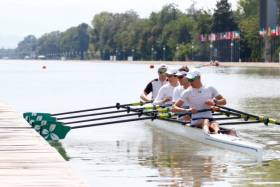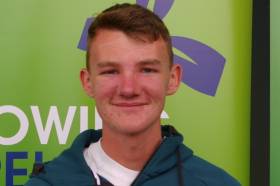Displaying items by tag: Lightweight Quadruple
#Rowing: Ireland took a second medal at the World Rowing Under-23 Championships in Bulgaria today. The lightweight quadruple of Niall Beggan, Stephen O’Connor, Andrew Goff and Shane O’Connell took bronze behind Switzerland and Austria.
Austria and Switzerland swapped the lead through the race, but the Swiss edged ahead in the final quarter. Ireland had a fine middle 1,000 metres and won their battle with Britain to gain a place in the medals. They were third as the crews drove for the line, but came within .28 of a second of catching the Austrians, who took silver.
Ireland’s David O’Malley and Shane Mulvaney took a bronze medal in the final of the lightweight pair.
World Under-23 Championships, Plovdiv, Bulgaria (Irish interest)
Men
Lightweight Pair – A Final: 1 Italy 6:33.05, 2 Turkey 6:36.70, 3 Ireland (S Mulvaney, D O’Malley) 6:37.63; 4 Britain 6:45.33, 5 France 6:46.74, 6 Denmark 6:53.36.
Lightweight Quadruple Sculls – A Final: 1 Switzerland 5:50.62, 2 Austria 5:52.09, 3 Ireland (N Beggan, S O’Connor, A Goff, S O’Connell) 5:52.37; 4 Britain 5:54.55, 5 Italy 5:56.46, 6 France 5:56.82.
Lightweight Double Sculls – Semi-Finals (First Three to A Final; rest to B Final)
Semi-Final One: 1 Denmark 6:18.69, 2 Italy 6:21.85, 3 Germany 6:23.22.
Semi-Final Two: 1 Canada 6:19.88, 2 Spain 6:20.66, 3 South Africa 6:21.69; 4 Ireland (F McCarthy, J McCarthy) 6:22.56, 5 Britain 6:23.77, 6 Poland 6:42.15.
Great Finish By Young Ireland Rowing Crew at World Championships
#Rowing: A stirring finish saw the Ireland lightweight quadruple elbow their way into the semi-final of the World Under-23 Championships in Rotterdam today. The young crew of Fintan McCarthy, Shane O'Connell, Stephen O'Connor and Colm Hennessy clung on to third behind impressive Germany and Sweden despite a big challenge by Canada.
World Rowing Championships, Rotterdam (Selected Results; Irish interest)
Men
Under-23 Lightweight Pair - Heat Two (First Three to A/B Semi-Final; rest to Repechages): 1 Turkey 6:39.80, 2 Greece 6:40.70, 3 Ireland (S Mulvaney, D O’Malley) 6:45.09.
Under-23 Quadruple - Heat Three (First two A/B Semi-Final; rest to Repechages) 1 Australia 5:52.01, 2 Italy 5:53.31; 5 Ireland (D Buckley, J Casey, P Boomer, S McKeown) 6:15.47.
Under-23 Lightweight Quadruple - Heat One (First Three to A/B Semi-Finals; rest to Repechages): 1 Germany 6:10.05, 2 Sweden 6:11.08, 3 Ireland (F McCarthy, S O'Connell, S O'Connor, C Hennessy) 6:12.63.

























































